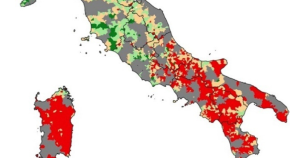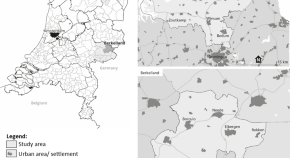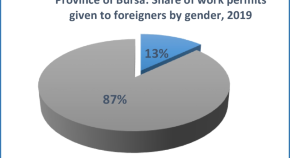Collection
“Welcoming spaces”: migration and new communities in marginalised regions
- Submission status
- Closed
The aim of the special issue is to explore various aspects (the creation, implementation, functioning, and evaluation) of the topic of the so-called “welcoming spaces” and “welcoming initiatives” for newcomers (different categories of migrants, including forced and voluntary) in host societies/countries in the context of relations between migration and new communities in regions defined as marginalised or shrinking, with particular emphasis on the EU member states and other selected non-EU cases (Turkey, Canada, Australia).
This special issue is inspired by the first results of the research activities conducted within the international project “Welcoming Spaces—Investing in ‘Welcoming Spaces’ in Europe: revitalising shrinking areas by hosting non-EU migrants” (2020-2024), implemented under the Horizon 2020 Framework Programme of the EU . The project consortium is composed of academic and non-academic partners from five EU countries: the Netherlands, Spain, Italy, Germany, and Poland. These are countries whose migration experiences after World War II were different and thus, today, their migration status is diversified (“old” immigration countries such as the Netherlands or Germany; recent immigration countries such as Italy and Spain; Poland, emigration-immigration country), representing the spectrum of policies and practices in welcoming newcomers. However, all these countries have been affected by intensifying demographic changes (e.g., ageing of the population, depopulation, internal migration) and important socio-economic developments (labour market shortages, the broadening services sector, etc.) since the early 2000s. Moreover, in recent years, these countries have experienced numerous challenges related to mobility and migration, including the migration and refugee-management crisis of 2015-2016, the sanitary crisis of the COVID-19 pandemic (2020-2021), and the pushbacks at the EU’s external borders (e.g., Poland and Spain). As a result, they are an interesting starting point for considerations on changes in international migration trends and their impact on the demographic, socio-economic, and political situations in the host countries. What is new is not so much the focus on large or secondary cities (to which the literature and research have already devoted a lot of attention), but rather on less frequently studied areas (small towns and rural areas).
Although the project started in early 2020, its assumptions, concept, methodology, and early results of the conducted research have already been widely presented and discussed internationally during various conferences to promote the concept of “welcoming spaces” in shrinking regions and learn about those worth paying attention to. These conferences included the European Sociological Association Research Network 37 (Urban Sociology) IV Midterm Conference “Urban Theory and Urban Praxis: Past, Present and Possible Futures” (January 2021), 18th IMISCOE Annual Conference 2021 “Crossing borders, connecting cultures” (July 2021), and the 10th Conference of the Committee on Migration Research of the Polish Academy of Sciences (September 2021). The interest in the project’s topic—as yet unexplored, niche and innovative—contributed to our decision to collect the most valuable results and papers and make them available in a special issue of a migration journal with significant reach. We are guided by the idea not to limit it geographically only to the countries studied within the H2020 project but also to consider interesting examples from outside the EU, including from other continents (Asia, North America, Australia).
To this end, our team composed of three guest co-editors of this special issue—Melissa Moralli, Marta Pachocka, and Maggi Leung—is truly international (affiliations in Italy, the Netherlands, and Poland), interdisciplinary (economics, sociology, media studies, political sciences, human geography) and a synergy of researchers at various stages of their academic career (research fellow, assistant professor, associate professor). In addition, we all have significant experience in implementing migration-related projects. We have published widely in international, high-impact journals and were involved in editorial work on special issues by highly recognised publishers such as Routledge, Emerald, Edward Elgar Publishing, and Peter Lang, and journals such as European Societies and International Migration.
The relevance of the topic
In recent years, there has been an increasing reflection at the global level on the challenges and potential of migration for regional development and especially for rural, mountainous, and peri-urban regions (Perlik et al., 2019; Schech, 2014). The growing interest in this topic is demonstrated by various programmes, such as the “Long-term Vision for the EU’s Rural Areas—Towards stronger, connected, resilient, and prosperous rural areas by 2040” in which the European Commission also explores the possibilities and opportunities for newcomers’ integration in non-urban contexts, or the Australian and American national projects “Welcoming Cities”, a network composed of municipalities and local stakeholders that want to valorise and support those areas aiming to become welcoming and inclusive for all. Furthermore, the importance of this topic is mainly related to the presence, sometimes paradoxical, of both restrictive migration policies and repressive measures against newcomers and a proliferation of initiatives aimed at welcoming them, documented by current migration scholarship (Heins, Unrau, 2018; Koos, Seibel, 2019; Rygiel, Baban, 2019). These initiatives are aimed at (co-) creating “welcoming spaces” and are often citizen-driven but can equally be the outcome of initiatives by local governments, NGOs, businesses, or they can be migrant-initiated. Nevertheless, going against “anti-migration” policies and discourses, such initiatives are often highly contested, if not even criminalised (Fekete, 2018; Driel, Verkuyten, 2020). Moreover, given the local scale of most of these initiatives, the dispersion in space and political sensitivity, the dynamics connected to these “welcoming spaces”, the imaginaries they convey, and the impacts on regional areas remain under-investigated by the scientific literature. In fact, the majority of the studies shedding light on the relation between migration and local development are well documented in larger metropolitan contexts. However, migration and development have long been interlinked (Bakewell, 2007; Raghuram, 2009). The connection is even more important for regional areas. In fact, although with different historical, cultural, and demographic traits, such areas are often characterised by not only a shrinking population, but also loss of services, infrastructure, places of social connection, and cultural production. Drawing upon these reflections, this special issue intends to present an interdisciplinary look at the role that migration can play for these places, its potential and opportunities, as well as its limits. The scope of this proposal, and the papers included here, is to focus on the development of the welcoming capacity of smaller cities, towns, villages, peri-urban areas, and “shrinking regions” undergoing demographic and economic decline, while reflecting on the factors (and combinations of them) supporting local development dynamics, collective action, multi-stakeholder collaboration, and institutional innovation. To do this, the papers contained in this special issue propose a vision of migrant that goes beyond the idea that migration is simply an asset/factor for boosting socio-economic growth. The idea is to see whether other models of regionalisation of migration can overcome forms of “subordinated inclusion”, inspired by the principle of moral indifference and irrelevant weight from the from the point of view of citizenship, rights and equality (Rye, O’Reilly, 2020).
The aim of this special issue is therefore to reflect on the multidimensional role of migration in reshaping regional areas, creating new opportunities, alternative spatiality, and, in some cases, counter-hegemonic imaginaries capable of challenging media misrepresentation supported by some outlets and anti-migration political discourse (Smets et al., 2019). The papers we propose range from single case studies, able to show the multidimensional, contested, and context-based nature of single experiences of welcoming areas, to cross-country reflections that try to explore the cultural, social, and economic impacts of regional migration and resettlement policies. From a theoretical and conceptual point of view, these papers illustrate how some integration initiatives at the intersection of migration and local development aim at the creation of new jobs and housing opportunities, hybrid forms of hospitality, and prospects to enhance local heritage, but also new spaces for social contact (Glick Schiller, Çağlar, 2016). Second, these initiatives can act at the level of narratives, trying to offer opposite representations to the dominant paradigm, which sees migration and internal areas only in terms of “problems to be solved” (Avelino et al., 2017), supporting a cultural turn, proposing alternative frames and policies able to enhance the potential of diversity in out-of-town contexts. Contexts which, in some cases, can be transformed into experimental spaces for more equitable, democratic and sustainable modes of regeneration.
Based on a review of the papers published in the Journal of International Migration and Integration, it appears that the concept of “welcoming spaces” has not yet been widely investigated in any article or special issue. Thus, we hope that such a thematic special issue would be an added value for the journal, opening readers and potential authors to knowledge and research in a new area, the importance of which will certainly be growing in the field of migration studies in the future.
Editors
-
Melissa Moralli
Melissa Moralli is a Postdoctoral Researcher and Research Fellow at the Department of Sociology and Business Law, University of Bologna. She holds a PhD in Sociology and Social Research focused on social innovations intended as bottom-up processes and practices initiated by civil society actors. She is visiting scholar at CRISES (Centre de Recherche sur les Innovations Sociales, Université du Québec à Montréal, Canada), IPK (Institute for Public Knowledge, New York University, USA), and CRISES Redifined (University of Jyväskylä, Finland). Her research interests are social innovation, migration and sustainable consumption.
-
Marta Pachocka
Marta Pachocka is Assistant Professor at the Department of Political Studies, the Institute of International Studies of the Collegium of Socio-Economics at SGH Warsaw School of Economics and the head of the Migration Policies Research Unit at the Centre of Migration Research (CMR) of the University of Warsaw. She received her PhD in economics in 2013; but her academic profile is truly interdisciplinary, including also political science and migration studies.
-
Maggi Leung
Maggi Leung is an Associate Professor at the International Development Studies section of the Department of Human Geography and Spatial Planning, Utrecht University. She works with transnational/translocal flow perspectives on uneven geographies of migration, mobilities, and development, internationalisation of education, knowledge mobilities and activism, Chinese migration and transnationalism, migrant investment, and other engagements in “shrinking” regions in Europe, COVID-19 (stigmatisation and geographies of in/exclusion).
Articles (10 in this collection)
-
-
“Welcoming Spaces”: Migration and New Communities in Marginalised Regions
Authors
- Melissa Moralli
- Marta Pachocka
- Maggi W. H. Leung
- Content type: OriginalPaper
- Open Access
- Published: 12 October 2023
- Pages: 823 - 838
-
Epilogue: Chicken or Egg? The Role of Newcomer Migrants in the Revitalization of ‘Left-Behind’ Areas
Authors
- Annelies Zoomers
- Content type: OriginalPaper
- Open Access
- Published: 10 October 2023
- Pages: 1001 - 1011
-
Cultivating Welcoming Communities in a Neoliberal Era: Narrative Meets Practice in Rural Saskatchewan
Authors
- Melissa Kelly
- Content type: OriginalPaper
- Published: 07 October 2023
- Pages: 939 - 956

-
Welcoming and Generative Local Welfare as an Agent for Territorial Development: A Case Study from Southern Italy
Authors (first, second and last of 4)
- Alice Lomonaco
- Maurizio Bergamaschi
- Paola Parmiggiani
- Content type: OriginalPaper
- Open Access
- Published: 05 August 2023
- Pages: 889 - 908

-
Spaces of Decoupling in the Netherlands and Poland: Emerging Local Governance Networks for Hosting Non-EU Migrants in Peripheral and Shrinking Areas
Authors
- Marlies Meijer
- Joanna Zuzanna Popławska
- Bianca Szytniewski
- Content type: OriginalPaper
- Open Access
- Published: 05 June 2023
- Pages: 839 - 862

-
Newcomers and ‘Roots Migrants’: Chain Migrations and the Revitalization of Rural Shrinking Areas in Spain
Authors
- Paula Alonso-Pardo
- Laura Oso
- Leticia Santaballa
- Content type: OriginalPaper
- Open Access
- Published: 15 May 2023
- Pages: 979 - 999

-
Correction to: The Neoliberal Face of the ‘Local Turn’ in Governance of Refugees in Turkey: Participatory Action Research in Karacabey, Bursa
Authors
- Ayhan Kaya
- Content type: Correction
- Published: 17 April 2023
- Pages: 937 - 937
-
The Neoliberal Face of the ‘Local Turn’ in Governance of Refugees in Turkey: Participatory Action Research in Karacabey, Bursa
Authors
- Ayhan Kaya
- Content type: OriginalPaper
- Published: 30 March 2023
- Pages: 909 - 936

-
Local Migration Governance in European Shrinking Areas: a German and an Italian Case
Authors
- José Ricardo Martins
- Chiara Davino
- Content type: OriginalPaper
- Open Access
- Published: 21 March 2023
- Pages: 863 - 888



